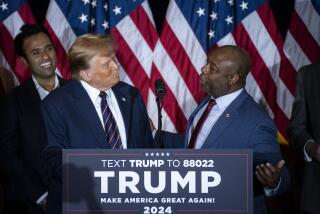Lott Decries Segregation, Struggles to Keep Post
- Share via
WASHINGTON — Scrambling to salvage his hold on power, besieged Sen. Trent Lott (R-Miss.) on Friday offered his most extensive apology yet for comments that seemed to endorse segregation and spurred criticism from across the political spectrum, including from President Bush.
Despite Lott’s latest bid to defuse the controversy, Republicans say it remains uncertain that he will survive a growing clamor -- from conservative GOP activists as well as from Democrats -- for him to resign his leadership post.
“I apologize for opening old wounds,” Lott said at a news conference in his hometown of Pascagoula, Miss., the day after Bush rebuked him. “I only hope that people will find it in their hearts to forgive me for that grievous mistake.”
But Lott, who is in line to become Senate majority leader when Congress convenes in January, adamantly refused to relinquish that post. The job will be crucial to moving Bush’s legislative agenda, and the furor surrounding Lott has raised questions about how effectively the senator can do that.
“I’m not about to resign for an accusation that I’m something I’m not,” Lott said.
No Senate Republican has openly called on him to step down, but Lott has been trying to shore up his position by calling GOP senators across the country to apologize.
“I know of no one in our party calling for him to step down,” Sen. Charles Hagel (R-Neb.) said in a terse statement after Lott’s news conference.
But privately, Senate Republicans are sounding each other out about Lott’s future. And one Republican political consultant close to the White House said Friday night, “It’s not a matter of if [Lott steps down as leader], it’s a matter of when.”
The spiraling controversy has caused trouble for Republicans in the aftermath of their triumph in the November elections, in which they seized control of the Senate and expanded their House majority. Instead of building on that momentum, the GOP finds attention focused on a politically wounded Senate leader -- and faces the prospect of a potentially divisive intraparty battle to replace him.
Either way, the controversy may undermine plans by the White House and congressional GOP leaders to begin the new Congress with quick action on an economic stimulus package and leftover budget issues. The Republicans would like to spotlight for voters the difference a GOP-controlled Congress can make.
Many Bush allies also are worried that the Lott flap will hurt the party’s political prospects in 2004 by energizing support for Democrats among African American supporters and setting back GOP efforts to reach out to minority voters.
Bush played a significant role Thursday in turning up the heat on Lott when he publicly rebuked his fellow Republican. The president termed “offensive” any suggestion “that a segregated past was acceptable.”
But Bush did not call on Lott to relinquish his leadership job. And White House spokeswoman Claire Buchan said that remained Bush’s position after the Friday news conference.
Buchan added that in Bush’s view, Lott’s comments on Friday were “candid, forthright and apologetic, and rightly so.”
Lott’s news conference was his fifth effort in as many days to quell the controversy triggered last week at a celebration of the 100th birthday of retiring Sen. Strom Thurmond (R-S.C.). At the party, Lott said that the country would have been better off if it had elected Thurmond president in 1948. Segregation was a central plank of Thurmond’s Dixiecrat platform.
Through the week, Lott issued three short, written statements and conducted two broadcast interviews by telephone to apologize. But many fellow Republicans demanded that he go further, suggesting he stand in front of television cameras and more explicitly repudiate his comments.
In his opening statement Friday, Lott said: “Let me be clear: Segregation and racism are immoral.
“Segregation is a stain on our nation’s soul. There’s no other way to describe it. It represents one of the lowest moments in our nation’s history and we can never forget that.”
Lott said, as he had earlier, that he did not intend his comments to be an endorsement of racism, but just a tribute to Thurmond. “I was winging it,” he said. “There were no venal thoughts in my mind.
“Let me make clear, though: In celebrating his life, I didn’t mean in any way to suggest that his views of over 50 years ago on segregation were justified or right,” Lott said.
He acknowledged that his surprise at the negative reaction to his words was evidence that he had a “blind spot.”
Asked about the recent spate of reports about his record on race issues -- such as his efforts to keep blacks out of his fraternity at the University of Mississippi -- Lott deflected the question to talk about how much racial attitudes have changed in Mississippi and the country over the last 50 years.
“Now, there’ll be some disagreement on the best ways to ensure that every American -- every American -- of every color and race and ethnic background has a fair and equal chance in life,” Lott said. “But our goals are the same, even though we’ll debate it on philosophical or partisan lines.
“We want a colorblind society [in which] every American has an opportunity to succeed; an end to the entrenched poverty and joblessness that has plagued minority communities and communities of all kinds in this state and across this nation; a good education for every child, that gives him a real chance for a good life and that rejects the soft racism of low expectations.”
In an effort to mend fences and communicate more directly with African Americans, Lott announced he would appear early next week on the Black Entertainment Television network to “talk about my hopes and dreams for the people in this state and this country, regardless of their race.”
But NAACP President Kweisi Mfume said Lott’s latest apology did nothing to change the group’s call for Lott to give up his leadership post. He said Lott’s remarks “come 22 years too late,” noting that Lott made similar remarks about Thurmond in 1980. “While we all believe in forgiving other people, this represents more than anything else a pattern of behavior.”
Nor was the Congressional Black Caucus mollified by Lott’s latest comments. The group, whose 38 members are all House Democrats, renewed its call for Lott to be censured.
Senate Democratic Leader Tom Daschle of South Dakota said Lott still has not clearly explained himself. “He indicated he did not mean any endorsement of segregation, but his news conference today did not provide an adequate explanation of what he meant,” Daschle said.
The most important question for Lott is whether he is keeping his fellow Senate Republicans on his side -- they are the ones who elected him majority leader last month.
Immediately after Lott’s news conference, about 30 of his GOP Senate colleagues participated in a conference call organized by Sen. Larry E. Craig (R-Idaho) to discuss the situation.
There was no push for his resignation, said a leadership aide who listened to the conversations. “We believe it’s time to move on and do the work of the American people,” the aide said.
But throughout the week, there have been signs of unease in the usually clubby, insular Senate, where members are loath to criticize each other publicly.
GOP sources said that two senators who are considered possible successors if Lott stepped down -- Sens. Don Nickles of Oklahoma and Mitch McConnell of Kentucky -- have been calling colleagues.
They are not openly campaigning for a leadership change, but “are calling members just to take their [political] temperature,” said one Senate Republican aide.
After Lott’s news conference, McConnell issued a statement saying, “I believe the American people will accept his apology and want us now to move forward together.”
Another senator regarded as a potential Lott successor is a White House favorite, Sen. Bill Frist of Tennessee, a Bush ally who just finished a successful run as chairman of the GOP campaign committee for the 2002 elections.
The most ominous aspect of the controversy for Lott is that so much of the criticism has come from the GOP’s conservative wing. Several conservative writers, activists and magazines have heaped scorn on him. The latest to do so Friday was the National Review.
The reaction has laid bare an undercurrent among Republicans that rarely surfaces: Although Lott is conservative, he has never been a favorite of many conservative activists outside the Senate. Some believe he never pushed hard enough for their agenda; others blame him for the GOP’s loss of Senate control in mid-2001 when Sen. James M. Jeffords of Vermont quit the party.
“This thing is not going away,” said one GOP operative. “It’s not the liberals who have kept this going. It’s the conservatives, the Republicans.”
Ironically, one senator who came to Lott’s defense Friday was Jeffords.
“I know Trent Lott to be a man of honor and good conscience,” Jeffords said.
*
Times staff writers Ronald Brownstein, Edwin Chen, James Gerstenzang and Maura Reynolds contributed to this story.
More to Read
Get the L.A. Times Politics newsletter
Deeply reported insights into legislation, politics and policy from Sacramento, Washington and beyond. In your inbox twice per week.
You may occasionally receive promotional content from the Los Angeles Times.












